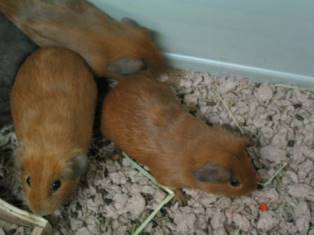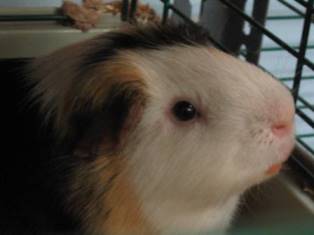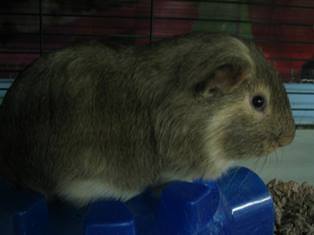Continuing with our series about guinea pig care, perhaps now you are a proud owner of one or more of these little cavies. Here are some things you should know about maintaining your guinea pig’s health and well-being:
Always seek veterinary care if you suspect your pigs are ill. If your guinea pig is losing weight for no known reason, do not delay contacting your veterinarian, as they hide their illnesses sometimes until it’s far too late to cure.

Other common signs of disease besides weight loss are lethargy, sneezing, coughing, diarrhea, hair loss and itching.
Regular dental exams are extremely important. Guinea pigs are born with one set of teeth that consist of front incisors and back molars. They have no middle teeth. It’s very common that they are brought to a veterinarian appointment starving because their back molars are overgrown and have strangled their tongue. Their molar points also could be hurting or lacerating their tongue. They can no longer eat comfortably in this condition. In most cases, the owner is not even aware that this is happening and that their pet is suffering.
Also, guinea pigs can develop a condition known as “bumble foot” (ulcerative pododermatitis) which present as open sores on the bottom of their hocks. This is a bacterial infection and inflammatory reaction that can occur especially if they are inactive or become overweight and spend too much time in wire and mesh cages. A veterinary call is in order if this condition develops, as antibiotics may be necessary to clear the infection. To avoid this condition, it is important to keep the cage clean to combat bacterial buildup. This can be achieved by adding a layer of cardboard or old clothing on the cage floor and changing this layer a few times a week.

Another condition to watch out for with your pet guinea pig is overgrown toenails. This can be quite painful if the nails grow into their pads. Ask your veterinarian to show you how to safely clip their nails, or bring your pet into the hospital so that one of the technicians can trim their nails on a regular basis.
Lice and mites can appear suddenly as balding, scabbing, itchy lesions on guinea pigs. It’s important to note that lice and mites are not contagious to people and are easily treatable. However, this causes a lot of discomfort for your pet, and your guinea pig should be examined and treated by a veterinarian. Mite infestations are usually more severe than lice. A vet can diagnose a mite infestation by performing skin scrapings of affected areas and viewing them under the microscope. Lice infestation can be detected in a similar manner by inspecting the hair. A treatment plan will be determined by your veterinarian.
Guinea pigs don’t need vaccinations like dogs, cats and people, but they do need to go to the veterinarian once or twice a year to check their weight, heart, and back molars.

If you are unable to regularly provide vitamin C through fruits and vegetables, then you may need to supplement vitamin C by adding it to their water. However, get your cavy used to it by adding tiny amounts of vitamin C to their water slowly over a few days. Some cavies might not drink vitamin C readily in their water unless you introduce it slowly. Vitamin C in pellets and commercial foods don’t last long and they may not provide enough of the daily nutrient. Vitamin C is easily destroyed by air, light and heat
We don’t advise using a multi-vitamin but rather a vitamin C supplement that can be administered with water with the recommended dose of 50 mg Vitamin C to 8 oz. drinking water daily.
Visit our Learning Center to source more information about Guinea pig care. Also feel free to call our office with questions and to schedule a wellness exam for pet.
Dr. Joe Martins, DVM, Belle Mead Animal Hospital

Dr. Joe Martins, DVM, Belle Mead Animal Hospital


